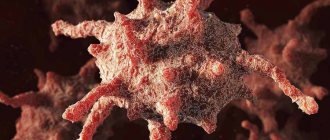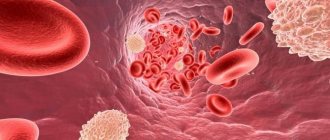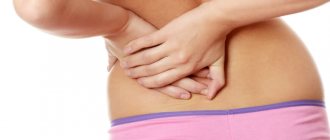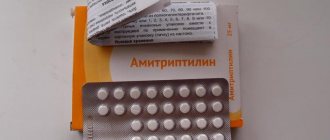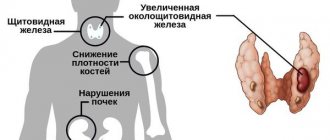As a result of a complex sequential metabolic process that ensures the smooth functioning of the muscular system, a residual breakdown product, creatinine, regularly enters the blood. This metabolite has toxic characteristics that have a negative effect, but if it is maintained normally, the body is not exposed to any risks.
Otherwise, when the concentration of a substance exceeds generally accepted standards, the situation can become quite serious. Such a sign can be a dangerous symptom of kidney diseases that affect their parenchyma, due to which the filtration capacity is significantly reduced. In some cases, an increase in creatinine may be due to physiological reasons, which is considered less dangerous.
But we should not forget about its harmful effects, and if a biochemical analysis (BAC) showed an increase in the concentration of this compound, then you should pay attention to your health. The first thing you need to do is consult a doctor, find out the reason for this increase, and then get recommendations on how to reduce creatinine in the blood.
Effective methods for quickly reducing creatine in the blood at home
An increase in creatinine levels is difficult to determine without tests; only after blood tests is it possible to draw conclusions and take action. Sometimes this is a temporary phenomenon associated with a sharp increase in physical activity, taking antibiotics, severe dehydration, increased protein content in food, burns, and radiation exposure. With a constant state of fatigue, swelling, and muscle pain, the likelihood of complications increases, in which case it is better to go to the doctor and get diagnosed. If you miss the moment and do not take action, this will affect the functioning of the kidneys, cardiovascular system, and thyroid gland. The inability to remove creatinine increases the amount of toxins and burdens the liver, affecting the nervous system and the cleanliness of the skin. Sometimes the level increases in the presence of cancer affecting the kidney area.
Reviews and results
For physiological reasons for increasing creatinine levels and for short-term use, nutrition does not cause discomfort in the patient’s life. However, in case of insufficiency of kidney function, when this nutrition is a vital necessity and must be adhered to constantly, certain difficulties arise.
First of all, strict calculations of protein, potassium, phosphorus and significant restrictions associated with this. This does not allow for diversification of the diet, and it looks quite meager. Patients are forced to compensate for the lack of protein with preparations of ketone analogues of amino acids. They provide the body with amino acids without burdening it with nitrogen. The second difficulty, according to many patients, is significant salt restriction.
- “... I have chronic renal failure - high blood pressure and high creatinine. I am very in control of my diet. I mainly eat potatoes, rice, oatmeal, cabbage, zucchini and sour cream with boiled vegetables. I cook with vegetable oil and without salt. In the summer I eat cucumbers and tomatoes, and add garlic, onions, a little horseradish and dill to my dishes. Berries and fruits have to be limited due to potassium. You can eat meat or fish up to 30 g. I take Ketosterol. This diet and medication help maintain kidney function and control azotemia.”
- “... For about a month I began to be bothered by periodic pain in the lower back on the right, fever up to 37.5, fatigue and nausea. She was examined and had a blood test. An ultrasound revealed kidney stones and pyelonephritis - this is the reason for the poor tests. She was treated well in the hospital and was discharged with recommendations: to drink a lot (herbal infusions, fruit drinks, lingonberry leaf infusion, clean water), limit meat for a month and salt for six months. But already in the hospital, when they administered antibiotics and relieved the inflammation, the biochemical tests returned to normal. I stuck to the diet for six months, now I’ll prepare for surgery to crush stones.”
- “... I have decompensated diabetes and my creatinine rises to 500. The doctor said that I need to switch to insulin and lose weight. It is also important to adjust your lifestyle according to physical activity, since any movement will improve the rate of filtration by the kidneys and speed up its excretion. You also need to drink more water - this is possible, since there is no swelling yet. In addition to all the dietary restrictions for diabetes, you need to reduce the amount of meat and exclude cottage cheese for a month or two. These measures really helped. We’ll have to continue to eat like this.”
What is creatinine
In order for us to always be energetic and alert, the body needs carboxylic acid (creatine), which is formed in the liver, kidneys, and regulates muscle contraction. When creatine performs its function, it is converted into a toxic substance - creatinine. If there are no pathologies in the kidneys, then its level does not exceed normal levels and does not cause any concern. But when deviations in the functioning of the excretory system appear, ailments arise, and intoxication of the body occurs.
Causes and symptoms
The level of creatinine in the blood is interrelated with the volume of muscle tissue and protein intake.
The more protein food you have, the more protein you need to remove. If the percentage of muscle content does not change too often with increasing loads or sudden weight loss after dieting, then the creatinine content remains stable. An increase in levels is called hypercreatininemia. It is manifested by muscle pain, frequent fatigue, swelling and a decrease (rarely an increase) in urine volume. Deviations from the norm cause:
- too frequent and heavy physical activity;
- non-compliance with the drinking regime (drinking liquid in small quantities);
- taking medications for muscle growth;
- depression of liver or kidney function.
Menu (Power Mode)
Limiting the intake of creatine from food and following a drinking regime quickly normalizes blood counts. This usually takes a week. Refusal of prepared meat products, limiting meat (especially red) and the parallel introduction of vegetables, fruits and cereals containing a high percentage of fiber will help normalize protein metabolism.
Nutrition for kidney disease is very strict, and it depends entirely on the level of azotemia . It is recommended to consume 0.6 g of protein (or less) per kilogram of weight, limit potassium (avocados, grapes, dried apricots, prunes, raisins, nuts, seeds) and phosphorus in foods (milk, bran, seeds, sesame, nuts, fish). Half of your daily protein intake should come from animals, since plant proteins do not contain the required set of amino acids . When preparing a diet, patients use potassium units and protein units.
Creatinine norm - table
Based on age and the content of muscle mass in the body, normal indicators change.
The highest values are acceptable for a healthy, active middle-aged man. In women, the numbers are slightly lower, but with the onset of pregnancy they decrease by 30-40%. After 40 years, the norm gradually decreases; with age, muscles become smaller, activity gradually decreases along with creatinine levels. Table of creatinine content in blood (normal):
| Age and gender | Normal values (mmol/l.) |
| Infants (up to 30 days) | 12-48 |
| Children under 12 months | 20-55 |
| Teenagers under 15 years old | 25-88 |
| Men | 55-106 |
| Women | 43-97 |
| Pregnant women | 35-80 |
The numbers may be different; in order to accurately understand your condition, it is better to calculate the optimal level with your doctor, taking into account your weight, age and previous diseases. In people who are overweight and without one kidney, the indicators will be higher, but all this is discussed at the appointment and taken into account when diagnosing.
How to reduce creatinine in the blood with folk remedies
It is not at all necessary to immediately start taking pills; often traditional methods and a balanced diet will significantly improve the situation and help avoid complications during treatment.
There are no harmless drugs; any intervention in the body with the help of chemicals can improve some indicators and worsen others. Even if it is no longer possible to do without medical intervention, herbal teas, leaves, and berries will help normalize a stable condition. nettle leaves
In addition to the diuretic effect, nettle also has a general strengthening effect, and also has a laxative and expectorant effect. The decoction can be made only from nettle leaves, or you can also add calendula flowers and knotweed. For brewing, take all components in equal proportions and pour in 2 tbsp. mixture with one glass of boiling water. It’s good to do this in a thermos, then strain the infusion before drinking. It is enough to consume 0.5 glasses a day, drinking in small sips throughout the day.
Sage
Collection with sage and burdock roots, dandelion leaves and birch bark due to the content of lithospermate B in it helps the kidneys remove creatinine faster. For 1 cup of boiling water take 3 tbsp. l. All ingredients, mixed in equal parts, prepare a decoction, which is consumed after filtering. It is enough to drink 3 tbsp at night. l.
Lingonberry (leaves)
It is better to brew them for 30 minutes in a water bath. For one day it will be enough to pour 250 grams. boiling water 60 gr. leaves. After preparation, you need to give it time to cool and then drink 1/3 cup 3 times a day. In addition to lingonberries, they also add chamomile flowers, violet, motherwort, string, and dandelion. Mix everything in equal parts, drink no more than 200 grams. per day, divided into 3 parts.
Rose hip
They use both berries and leaves, add hawthorn leaves, dill seeds, bay leaves, and parsley root. To prepare, take 2 dessert spoons and pour 200 ml. boiling water The tea must be infused for at least 3 hours, it is better to leave it overnight, take 5 tbsp the next day. l. 7 times a day. Tea made from pomegranate peels and rose hips, mixed equally, also enhances the secretion of urine. To get the daily norm - 0.5 liters. water is poured into a thermos and left for about 30 minutes, consumed in small portions. Such decoctions also help maintain vitamin C levels.
Dandelion roots
Violet flowers, celandine, St. John's wort are also added to them, and 1 tbsp is mixed. l., boil in 0.5 l. water and leave for about 1 hour, wrapping it up to keep warm. After preparation, filter and drink three times a day 30 minutes before meals. To obtain results, you must continue taking it for at least 30 days.
Chamomile and mint
Chamomile flowers and mint are prepared in a steam bath, left for 40 minutes, and filtered. For daily intake, use 2 tsp. both components per 1 glass of cool water. Take 0.5 cups in the morning and evening.
Oak bark
There are several recipes that normalize creatinine levels. In the first case, take oak bark and bearberry in equal quantities (about 2 tablespoons of the mixture), pour 200 ml. water, bring to a boil over low heat, filter, divide the intake into several approaches, drinking 6 tbsp each time. l.
In the second option, in addition to oak, birch bark and buds are also added. Mix in equal proportions, separate 4 tbsp. l. and pour 1 liter. water. All this must be kept on low heat for at least 60 minutes, after which it is infused, cooled and filtered. Drink 0.5 cups up to 6 times a day.
Contraindications
Herbal remedies are sometimes not so harmless, especially if taken regularly. Before introducing them into your diet, you need to learn about the characteristics of each component and monitor negative reactions as you consume them. Women need to be very careful when using sage; its use is dangerous for pregnant women (in any trimester it threatens the fetus), during breastfeeding, and with oncology of the uterus and breasts. It is also better for those with hypertension to refrain from using it, as their blood pressure may increase. Also, people with acute kidney inflammation are advised to choose other remedies. If in any doubt, it is better to refrain from untested methods and be sure to consult a specialist.
Authorized Products
A diet for high creatinine should contain:
- Lean chicken breast, turkey, boiled veal. When cooking, the meat is first boiled and then cooked at your discretion (you can bake or stew with vegetables). This technique reduces nitrogenous substances. Portion no more than 55-60 g 2 times a week.
- Eggs - one per day and no more than three per week.
- 300-400 g of vegetables. The side dish can be prepared from stewed carrots, pumpkin, cabbage, sweet peppers, beets, eggplants, cauliflower, tomatoes, green peas, zucchini, limiting the consumption of potatoes and legumes (contain protein). Most vegetables should be eaten raw and often include lettuce. If potassium restriction is prescribed, vegetables are soaked for several hours before cooking.
- Vegetarian cereal and vegetable soups, including cabbage soup, borscht and beetroot soup.
- Low-fat white fish: hake, navaga, pike, pike perch, carp, blue whiting, pollock, cod. It is prepared like meat, the portion is the same.
- Cereals vary in preference (they are limited in the diet for chronic renal failure).
- Fruits and berries, processed and raw.
- Milk and fermented milk products up to 200-300 g, if there are no restrictions. Cottage cheese is consumed in quantities of up to 50 g daily.
- Rosehip infusion, vegetable and fruit juices, weak tea and coffee.
- Butter and vegetable oil.
Table of permitted products
| Proteins, g | Fats, g | Carbohydrates, g | Calories, kcal | |
Vegetables and greens | ||||
| zucchini | 0,6 | 0,3 | 4,6 | 24 |
| cauliflower | 2,5 | 0,3 | 5,4 | 30 |
| potato | 2,0 | 0,4 | 18,1 | 80 |
| carrot | 1,3 | 0,1 | 6,9 | 32 |
| beet | 1,5 | 0,1 | 8,8 | 40 |
| tomatoes | 0,6 | 0,2 | 4,2 | 20 |
| pumpkin | 1,3 | 0,3 | 7,7 | 28 |
Fruits | ||||
| watermelon | 0,6 | 0,1 | 5,8 | 25 |
| melon | 0,6 | 0,3 | 7,4 | 33 |
| apples | 0,4 | 0,4 | 9,8 | 47 |
Berries | ||||
| strawberry | 0,8 | 0,4 | 7,5 | 41 |
Cereals and porridges | ||||
| buckwheat (kernel) | 12,6 | 3,3 | 62,1 | 313 |
| white rice | 6,7 | 0,7 | 78,9 | 344 |
| sago | 1,0 | 0,7 | 85,0 | 350 |
Confectionery | ||||
| jam | 0,3 | 0,2 | 63,0 | 263 |
| jelly | 2,7 | 0,0 | 17,9 | 79 |
| milk candies | 2,7 | 4,3 | 82,3 | 364 |
| fondant candies | 2,2 | 4,6 | 83,6 | 369 |
| paste | 0,5 | 0,0 | 80,8 | 310 |
Raw materials and seasonings | ||||
| cinnamon | 3,9 | 3,2 | 79,8 | 261 |
| dried parsley | 22,4 | 4,4 | 21,2 | 276 |
| sugar | 0,0 | 0,0 | 99,7 | 398 |
| milk sauce | 2,0 | 7,1 | 5,2 | 84 |
| sour cream sauce | 1,9 | 5,7 | 5,2 | 78 |
| caraway | 19,8 | 14,6 | 11,9 | 333 |
| dried dill | 2,5 | 0,5 | 6,3 | 40 |
Dairy | ||||
| milk | 3,2 | 3,6 | 4,8 | 64 |
| kefir | 3,4 | 2,0 | 4,7 | 51 |
| cream | 2,8 | 20,0 | 3,7 | 205 |
| sour cream | 2,8 | 20,0 | 3,2 | 206 |
| curdled milk | 2,9 | 2,5 | 4,1 | 53 |
| acidophilus | 2,8 | 3,2 | 3,8 | 57 |
| yogurt | 4,3 | 2,0 | 6,2 | 60 |
Meat products | ||||
| rabbit | 21,0 | 8,0 | 0,0 | 156 |
Bird | ||||
| boiled chicken | 25,2 | 7,4 | 0,0 | 170 |
| turkey | 19,2 | 0,7 | 0,0 | 84 |
Eggs | ||||
| chicken eggs | 12,7 | 10,9 | 0,7 | 157 |
Oils and fats | ||||
| corn oil | 0,0 | 99,9 | 0,0 | 899 |
| olive oil | 0,0 | 99,8 | 0,0 | 898 |
| sunflower oil | 0,0 | 99,9 | 0,0 | 899 |
| ghee | 0,2 | 99,0 | 0,0 | 892 |
Non-alcoholic drinks | ||||
| mineral water | 0,0 | 0,0 | 0,0 | — |
| coffee with milk and sugar | 0,7 | 1,0 | 11,2 | 58 |
| black tea with milk and sugar | 0,7 | 0,8 | 8,2 | 43 |
Juices and compotes | ||||
| apricot juice | 0,9 | 0,1 | 9,0 | 38 |
| carrot juice | 1,1 | 0,1 | 6,4 | 28 |
| pumpkin juice | 0,0 | 0,0 | 9,0 | 38 |
| * data is per 100 g of product | ||||
How to reduce creatinine with drugs
Reduced levels can be achieved with the help of medications. You should not prescribe medications yourself without supervision from a physician; any self-medication can result in serious consequences. Some tablets may, on the contrary, increase the creatinine content, so you should take this into account and carefully read the composition. For example, vanadium, ibuprofen, ACE inhibitors and cyclosporine provoke exacerbation when taken uncontrolled. Most often, doctors prescribe:
- Ketosteril (according to a doctor’s prescription, 2-8 tablets per day, 3 times a day with meals);
- Supplements with alpha-lipoic acid cleanse the blood of toxins and help maintain creatinine levels within normal limits (up to 300 mg per day);
- Chitosan - in addition to weight loss, it filters the blood (the dose is selected individually and ranges from 1 to 4 g per day);
- Lespeflan - only according to the regimen that is selected by the doctor, specifically taking into account your state of health.
Medicines to reduce indicators
If during the examination of the patient it turned out that no pathologies associated with the upward shift of the substance were found, then the doctor explains what measures will help lower creatinine in the blood. In case of minor deviations, a specialist can recommend a specific list of drugs that regulate protein-amino acid metabolism and contain alpha-lipoic acid.
The choice of such medications is made solely by the doctor based on test data and the patient’s condition. The dosage is calculated according to the same principle. For such purposes, Chitosan, Ketosteril and Lespeflan are used. These drugs, like many others, have contraindications and can cause a certain number of side effects.
Therefore, a doctor should prescribe and monitor treatment with these medications, and periodically monitor blood composition using a LHC. Do not forget that self-medication is dangerous due to multiple complications, which often lead to very sad consequences that cause irreparable damage to the body.
What to do to prevent creatinine from increasing
If research has revealed violations, then in addition to using tablets and decoctions, you should think about your lifestyle and diet. Most often, the appearance of such deviations indicates serious problems with the kidneys, so temporary measures will not be enough. Fluid control, moderate physical activity, diet correction - it’s best to make all this part of your daily routine and stick to it regularly. You can also add massage sessions, cold laser physiotherapy, warm baths or osmotherapy.
How to eat
A very effective method is to eat less foods containing animal protein.
Such products force the kidneys to work harder, which negatively affects the amount of substances excreted. It is better not to eat vegetables and fruits high in potassium so that it does not accumulate in the body. Food containing phosphorus is difficult for weakened kidneys to process, so it is better to find out in advance where it is contained and reduce the amount of such products. Athletes and those who regularly use nutritional supplements should review the composition of the medications they take and exclude those that contain vanadium and creatine.
| Product | Add to food | Reduce consumption | Exclude |
| Plant foods (berries, parsley, cauliflower) | + | ||
| Animal protein (red meat, dairy products) | + | ||
| Anything with a lot of phosphorus (pumpkin, zucchini, cheeses, fish, soybeans) | + | ||
| Anything with a lot of potassium (dried fruits, banana, spinach, potatoes) | + | ||
| Salt, sugar, chicken eggs | + | ||
| Pickles, preserves, ketchup, store-bought sauces | + | ||
| Coffee, strong tea | + | ||
| Sports nutrition containing creatine | + |
Rice for breakfast
If you cook rice for breakfast for a month and eat it without salt and oil, then your creatinine level will gradually normalize. For the best effect, it is soaked overnight in cold water to swell, and only then boiled for breakfast. For a serving take 6 tbsp. spoons and pour water so that it covers it by two fingers.
Daily regime
To reduce critical indicators and reduce the load on the kidneys, it is better to review your daily routine and stick to it regularly. First of all, it is necessary to maintain water balance and drink clean water in the required quantities throughout the day. Choose the level of physical activity so that it is not too high, but allows you to maintain muscle tone. You may have to replace exhausting running and dumbbells with yoga and walking. It is very important to get enough sleep at night; this will require at least 8-9 hours. Walks in parks and forests should also be included in your daily routine if until now you have devoted little time to this. Increased levels of stress and emotional distress provoke deviations from the norm; to correct this, you should constantly devote time to relaxing and reviewing your reactions to life events.
Sample menu for the week
the “table No. 7” diet according to Pevzner is best suited to reduce creatinine and urea Its key features:
- proteins per day – no more than 25 grams;
- fats should also be limited to 90 grams per day, while giving preference to unsaturated fatty acids;
- carbohydrates – milk and vegetable.
The menu for the week will be as follows:
- Monday. Breakfast - sour cream with fruit, tea with lemon, maybe a few slices of orange. Lunch – lean cabbage soup and potato casserole. Dinner – pilaf with chicken, fruit, compote.
- Tuesday. Breakfast - vegetarian cutlets or potato cakes with compote or juice. Lunch – soup with rice in vegetable broth, potatoes with boiled or baked chicken breast. Dinner – baked fish with herbs and citrus fruits.
- Wednesday. Breakfast - low-fat cottage cheese casserole with fruit. Lunch - pasta with boiled vegetables, as well as vegetable broth. Dinner – vegetable casserole (carrots and beets are best, you can add zucchini and bell pepper).
- Thursday. Breakfast - potato cutlets and 2 chicken eggs (boiled). Lunch – rice soup with vegetable broth, baked chicken. Dinner – carrot casserole with prunes, fish and onions.
- Friday. Breakfast – egg omelet with beets, pickled onions, compote. Lunch – rabbit or chicken in tomato sauce, fruit salad. Dinner – bulgur porridge and fresh fruit.
- Saturday. Breakfast – baked apples with honey. Lunch – chicken cutlets with flaxseed oil, as well as buckwheat porridge, green tea. Dinner – herring under a fur coat, seafood, fruit.
- Sunday. Breakfast – jelly with pancakes, honey. Lunch – stewed potatoes with carrots, beets, maybe seafood. Dinner – vegetable soup with noodles, fruit salad and green tea with honey.
You can also add afternoon snacks to your diet, but they should mainly consist of fresh fruits and vegetables. Instead of regular bread, when following a diet, include whole grain or bran bread (at your discretion).
How to reduce creatinine in the blood
Creatinine is a byproduct of the breakdown of creatine, which is involved in the human body in the process of energy production. Creatinine appears in the muscles and then enters the blood, which is filtered by the kidneys. As a result of this purification, creatinine is excreted from the body along with urine. When the process of releasing a substance from the body is disrupted, its concentration in the blood increases, and this has an extremely negative effect on the patient’s health. If this pathology is not detected in a timely manner, severe kidney failure may develop, which will require serious treatment. In order to reduce creatinine in the blood, you can use medications and folk remedies. In addition, a review of nutrition is also required, since the level of creatinine largely depends on what substances enter the body.
What causes creatinine to increase?
There are many reasons for impaired creatinine excretion from the body, and not all of them are related to illness, but in any case, leaving an elevated level of the substance in the blood is unacceptable. Most often, excess of permissible creatinine levels not related to illness is caused by the following reasons:
- excessive physical activity - when the body is subjected to significant physical activity, the muscles require much more energy to work than usual, which causes an increase in creatinine. In most cases, the body itself copes with such a violation after receiving proper rest. If a person is pumping up muscles, then in this case, due to prolonged and constant overload, medication may be required to reduce creatinine;
- following a carbohydrate-free diet - many who want to lose weight resort to such a diet, since it is very effective, and do not think about the fact that the absence of carbohydrates in the diet (even for several days) leads to severe damage to the body. As a result of this diet, the body begins to break down muscle fibers to obtain carbohydrates, which are vital. As a result of such self-destruction of the body, a disruption in the functioning of the kidneys and active formation of creatinine occurs, which is not fully excreted;
- the use of a number of medications - some antibiotics, as well as ibuprofen, when taken for a long time, disrupt the blood filtration process, which is why the level of creatinine increases noticeably, and measures aimed at reducing it are required;
- age-related changes in the body that occur in adolescents;
- significant dehydration - in this case, an increase in creatinine levels occurs due to insufficient urine production;
- improper nutrition - when an excessive amount of protein food comes with food, when it is broken down, too much creatinine is formed, the elimination of which is difficult for the body to cope with even with good kidney condition;
- obesity;
- pregnancy;
- breastfeeding period.
If we talk about diseases that provoke an increase in creatine content, these include:
- autoimmune diseases in which the integrity of connective tissues is disrupted;
- diseases of the endocrine system;
- kidney disease;
- severe liver diseases;
- large area burns;
- myasthenia gravis;
- muscular dystrophy in severe form;
- leptospirosis;
- oncological diseases;
- gangrene.
If the level of creatinine in the blood has increased for reasons not related to the disease, you can reduce it on your own. When the cause of the pathology is illness, it will not be possible to do without medical help.
6 more important tips
In addition to diet, doctors in such cases recommend adhering to the following recommendations:
- Bad habits. Both alcohol and nicotine are substances that contribute to the accumulation of toxins in the body. They can also retain creatinine. Alcohol derivatives also negatively affect the performance of the urinary system.
- Reducing physical activity. If a person actively and regularly visits the gym or plays sports, then temporarily either stop exercising altogether or minimize physical activity (paying attention, for example, to stretching and cardio training). Reducing muscle work reduces the amount of creatinine produced.
- Healthy sleep. Probably everyone knows that active growth of muscle mass occurs at night. Accordingly, adequate sleep normalizes this process and “stretches” the process of creatinine release into the blood. That is why its level decreases somewhat with proper rest.
- Starvation. If someone uses this method of cleansing the body, then with increased creatinine, this is a great idea. The main thing is not to refuse food for longer than 24 hours. Longer fasts should be performed exclusively under medical supervision.
- Do morning exercises. Helps accelerate the release of creatinine, which is why its level immediately rises, but after 1 - 2 hours it sharply drops to the required level. But it’s better not to do it in the evening.
- Avoid overly salty foods. Various kinds of snacks, chips, crackers - all this is a rich source of sodium. It also needs to be reduced if creatinine is high, while potassium will automatically rise to the nominal level.
For other factors, see the table:
Creatinine levels necessarily decrease in the first and second trimester of pregnancy. This is a natural reaction of the body to changes in metabolic processes and the functioning of the endocrine system.
What are the symptoms of elevated creatinine levels?
When the level of creatinine in the blood increases, a person immediately feels a number of manifestations of this disorder. It is the symptoms that should serve as a reason for an urgent visit to the doctor and testing. The following manifestations allow one to suspect an increase in creatinine levels:
- muscle pain of varying intensity - they can be observed both during movement and at rest;
- swelling of varying localization and degree;
- severe muscle weakness;
- particularly rapid fatigue;
- a rapid change in the volume of urine excreted per day - both its increase and decrease can be observed;
- constant general malaise.
And which ones raise it - Top 6
But the following foods are considered to increase creatinine levels in the blood:
- Fatty meats. Beef, pork, and sausages are especially “dangerous.” It is much better to eat chicken and rabbit instead.
- Spinach and sorrel. They increase the acidity of the blood plasma, at which creatinine also increases. It is not necessary to completely abandon them, but you definitely should not abuse them.
- Bananas, apricots. They contain a considerable amount of plant proteins. They increase creatinine no worse than fatty meats.
- Cottage cheese and cottage cheese. Although they are a valuable source of vitamin D, they are rich in complex proteins, from which creatinine is subsequently formed. It is better to replace them with less fatty fermented milk products, such as low-fat kefir or milk.
- Alcohol, carbonated drinks. They do not directly affect the synthesis of creatinine, but they disrupt the functionality of the urinary system, which is why it lingers in the blood. It is better to replace them with plain water and natural juices with pulp.
- Tea and coffee. It’s better to give them up at least temporarily. Green and chamomile tea are fine.
It is also worth temporarily giving up “sports” nutrition. Its main composition is protein - this is protein. And, as mentioned above, it should be minimized in the diet.
Folk remedies to lower blood creatinine levels
Many plants have the ability to reduce creatinine levels in the blood, but only if they are properly prepared as a medicine.
- Mint infusion perfectly reduces creatinine levels in the blood. To prepare it, you need to take 2 tablespoons of dried mint and pour 500 ml of boiling water. After this, the drug is infused in a thermos in a warm place for 2 hours. Next, the medicine is filtered well and drunk during the day. This mint remedy has a pronounced diuretic effect and allows you to quickly cleanse the blood of excess creatinine.
- Nettle is another natural medicine that quickly cleanses the body. In order to obtain a remedy, you need to pour 2 tablespoons of dried or fresh herbs into 250 ml of water that has just boiled. After this, the composition is infused for 60 minutes, covered with a lid and insulated with a blanket. After filtering the medicine, take 1/2 cup in the morning and evening.
- Lingonberry leaves will be very useful for elevated creatinine levels in the body. You need to prepare a medicinal composition from them according to the following recipe: 60 g of dry leaves of the plant are poured with 1 glass of just boiled water and placed in a water bath. Boil the medicine in this way for 30 minutes. After cooling, filter the mixture and drink 1/3 cup 3 times a day.
- Sage is an excellent medicine for normalizing creatinine levels. This remedy is very effective, but it is better to avoid it during pregnancy. To prepare a preparation based on sage with the addition of other medicinal plants, follow this recipe: 4 tablespoons of sage herb are combined with 3 tablespoons of dandelion leaves, 3 tablespoons of birch bark and 3 tablespoons of burdock root. After mixing the mixture well, take it in a volume of 3 tablespoons and pour 1 glass of boiling water. Infuse the medicine for 3 hours in a thermos. After straining the drug, take 3 tablespoons before bedtime.
- Rose hips and pomegranate peels will also help reduce creatinine levels in the blood. To carry out therapy, you should take 1 tablespoon of pomegranate peels and rose hips and, pour into a thermos, pour 500 ml of just boiled water. Infuse the drug for 30 minutes. Take the strained product throughout the day.
- Dandelion root is a natural remedy for reducing creatinine in the blood. To obtain the drug, you need to take 1 tablespoon of the crushed root of the plant, add 500 ml of water and, putting it on low heat, bring to a boil. After this, the drug is boiled for 5 minutes and left to brew until it cools completely. Drink 60 ml of the decoction 4 times a day 30 minutes before meals.
The duration of therapy, depending on the level of creatinine and the body’s individual response to the drug, is determined separately for each patient.
How to independently monitor creatinine levels?
In addition, you can familiarize yourself with the following information, thanks to which it is easy to normalize this indicator. There are enough ways to reduce creatinine, and you may not even have to use medications. Although for the last condition it is necessary to identify deviations from the norm in an unadvanced form.
Nutrition correction
For some patients with mild hypercreatinemia (increased creatinine), a properly balanced diet will be an excellent recommendation and will help quickly bring blood composition into order. Dietary nutrition for such manifestations mainly involves limiting the intake of protein foods. However, this can only be done after consulting a doctor, so as not to create additional health problems.
The duration and severity of such a diet for each person is calculated individually, taking into account his condition, age and other related factors. As a rule, the following are excluded:
- fatty and protein foods - meat, fish, cheeses, milk;
- baking from yeast dough, bakery products, sweets;
- hot, spicy, smoked, marinated and fried dishes.
They also sharply reduce the consumption of sugar and salt (at the beginning it is reduced to 2-3 grams per day). Neglecting these requirements can cause an increase in blood pressure (BP) and a further increase in creatinine. Eggs and meat products are allowed to be eaten no more than three times a week, and no more than 200 grams of meat. You cannot completely give up these products, as they provide the body with the necessary supply of vital substances.
For a designated period of time, foods containing a lot of phosphorus and potassium are limited in the diet: nuts, dried fruits, potatoes, bananas, zucchini, pumpkin, etc. It is not forbidden to eat grain porridge, dairy products, olive and sunflower oil in the usual quantities. You are allowed to drink non-carbonated water, juices, fruit drinks, tea and various herbal infusions.
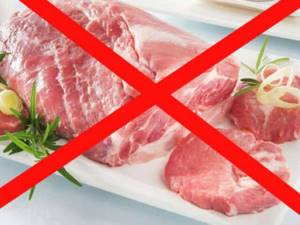
Fatty meats (pork) and fish are prohibited if creatinine levels are high
Normalization of lifestyle
One of the main components of preserving and maintaining health throughout human existence is lifestyle. Well-being, performance, and the tendency to develop diseases depend on its quality. Therefore, proper nutrition, dosage of work and rest, adherence to drinking regime, bad habits and activity - everything can affect the activity of any organ. And the kidneys are no exception in this case.
Drinking regime
So, to lower creatinine, you need to follow a few simple rules. Be sure to drink enough fluid - if there is a shortage, the body will become dehydrated and, therefore, the concentration of the substance will increase. The norm for a healthy person to drink liquid is approximately 1.5–2 liters of still water per day.
Reference! The required daily volume of fluid consumed is an individual value and is determined for each person depending on age, body weight and characteristics of the body.
It is worth remembering that exceeding the daily volume is also undesirable, since filtering more fluid will overload the kidneys. In case of renal failure, such side effects should be feared, because they can cause complications.
Physical activity
For each person, the required level of physical activity is individual and is determined by his age, fitness and endurance of the body, as well as his state of health. Of course, sports and basic physical education should be the norm, but not everyone loves and strives to devote time to it.
If the increase in creatinine is caused by excessive muscle activity, then actions that lower it should be aimed at reducing such activity. After all, the more work the muscles produce, the correspondingly more of the final product is released. Therefore, intense workouts associated, for example, with weightlifting, can be replaced by race walking or yoga.
Sleep stabilization
To maintain normal kidney function, sleep plays two roles. The first is to reduce the load on the urinary system, since during sleep all processes slow down and many organs, including the kidneys, “rest.” The second role is healthy, full sleep, at least 6–8 hours, which allows the body to replenish wasted energy and missing resources. Chronic lack of sleep leads to a stressful state, as a result of which an increase in creatinine is observed.
Medicines to lower blood creatinine levels
Today, to reduce the level of creatinine in the blood, you can use not only folk remedies, but also medications, but only if they are prescribed by your doctor. Most often, patients are prescribed:
- Chitosan is a means of promoting weight loss and also improves blood filtration by the kidneys, which allows the removal of excess creatinine. The method of using the medicine is selected by the doctor individually for each patient;
- ketosteril - this drug is taken 3 times a day in a dosage of 2 to 8 tablets. The exact dose of medication is established by the attending physician for each individual patient;
- Lespeflan - the drug is taken strictly according to the regimen developed by the doctor and in the dosage selected by him.
It is strictly forbidden to prescribe medications on your own, as in most cases this will cause serious harm to the body.
Contraindications
Particular care should be taken when taking sage. It is prohibited to use during pregnancy at any stage (it can cause miscarriage), it is not recommended for nursing mothers, or for breast and uterine cancer. This plant can also increase blood pressure, so it should be taken with caution by hypertensive patients. For acute inflammation of the kidneys, sage should be used only in consultation with your doctor.

Be extremely careful when using sage during pregnancy!
Proper nutrition to lower blood creatinine levels
Following a certain diet is also necessary in order to cope with the problem. In case of this violation, the following must be excluded from the menu:
- fat meat;
- fatty fish;
- full fat milk;
- baking from yeast dough;
- smoked meats;
- spicy;
- roast;
- spices.
A number of products should not be completely excluded, but simply limit the amount of their consumption. These include:
- sugar;
- salt;
- chicken eggs (no more than 3 per week);
- lean meat (no more than 3 times a week);
- fish (no more than 3 times a week).
The following are permitted without any restrictions:
- vegetables;
- fruits;
- dried fruits;
- nuts;
- dairy products;
- cheese;
- porridge;
- durum wheat pasta;
- vegetable oil;
- mineral water;
- compotes;
- juices;
- fruit drinks.
By adhering to a diet, some patients (even without additional treatment) bring creatinine back to normal. This effect is usually observed if the pathology was intercepted at the very beginning, before the appearance of pronounced symptoms.
It is unacceptable to ignore an increase in the level of creatinine in the blood, and at the first manifestations of this failure, you should urgently take all measures to restore your health.
Proper nutrition will reduce risks
One of the most important points in normalizing creatinine levels at home is diet therapy. Its basic rules are as follows:
- restriction of protein foods;
- reducing salt and potassium in the diet.
Avoid foods high in protein. First of all, this concerns animal products - they are the main source of dietary creatinine. With elevated levels of this substance, such products can be harmful to your body. However, remember that you cannot completely eliminate protein from your diet, so try to compensate for its deficiency with protein of plant origin.
If you have kidney problems, you should also limit your intake of potassium, since this trace element can accumulate in the body, and the excretory system simply cannot remove it in the required quantities.
Salt is known to promote fluid retention and increase blood pressure in the body. These factors lead to an increase in creatinine. Therefore, it is necessary to select foods with the lowest possible salt content so that its maximum daily intake does not exceed 2-3 g.
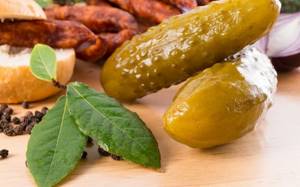
Lovers of salty, spicy and smoked foods will have to tighten their belts!
We recommend that athletes pay special attention to the composition of the dietary supplements they take. Many of them contain creatinine. It is better to exclude such additives.
It is recommended to completely exclude from your diet:
- fatty meat and poultry;
- fatty fish;
- milk with a high percentage of fat content;
- bakery products made from yeast dough;
- fried foods;
- smoked meats;
- spicy dishes;
- spices, sugar and salt.
Reduce consumption or eliminate from diet (photo)
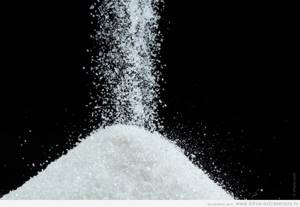
Salt
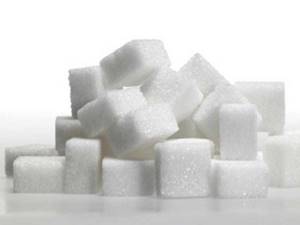
Sugar
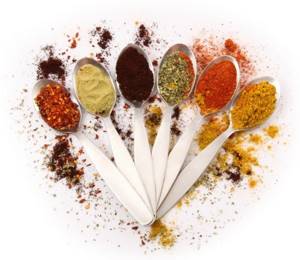
Spices

Spicy dishes
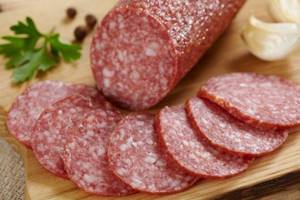
Smoked meats

Fried foods
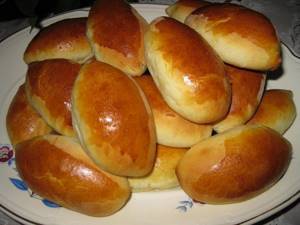
Pies with yeast dough
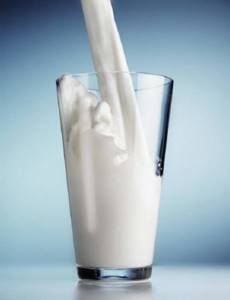
Full fat milk
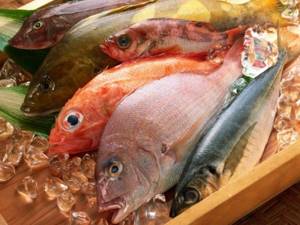
Fatty fish

Fat meat
Limit your food intake:
- dietary meat. You can make meat days separately, no more than 2 times a week, including it in larger quantities in dishes;
- chicken eggs - up to two or three per week;
- fish.
Authorized and recommended products:
- boiled vegetables, fresh fruits - in unlimited quantities;
- fruit drinks, compotes, berries;
- dried fruits and nuts (excluded only in case of renal failure);
- yogurt, kefir, fermented baked milk, cream cheese;
- vegetable oil;
- porridge and cereals, especially rice;
- pasta and bread based on wholemeal flour;
- purified and mineral water;
- honey;
- steamed dishes, stewed, boiled, mashed potatoes, cream soups, salads, casseroles, meatballs, jelly.
The essence and tasks of creatinine
Creatinine is a substance formed as a result of the creatine-phosphate reaction. Initially, the metabolite accumulates in the muscles. Since muscle tissue is constantly contracting, it needs a stable supply of energy.
The main energy carrier is creatine phosphate - the amino acid creatine, which during the synthesis process is converted into energy and the end product of creatinine reactions.
Roughly speaking, thanks to metabolic processes, the food that a person consumes is converted into energy.
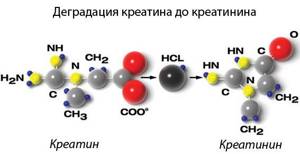
Further use of creatinine by the body is impractical, so the issue of its withdrawal is very important for maintaining a normal level of health.
Creatinine is excreted through the kidneys, along with urine. However, some amount of creatinine still remains in the body - in the blood plasma.
This is necessary to maintain the viability of muscle tissue. Maintaining a balance and stable concentration of creatinine in the blood is the key to human health and the normal functioning of internal organs.
Disruption of metabolic processes that contribute to an increase in the level of creatinine in the blood is regarded as a pathological sign indicating functional disorders of the kidneys.
Moreover, the accumulation of creatinine in the blood leads to toxic damage to internal organs and tissues.
The greater the muscle mass, the higher the level of creatinine in the blood.
In men, this indicator is usually higher, due to the physiological characteristics of the body; in women, it is correspondingly lower. The volume of muscle mass is a fairly stable value, as is the creatinine level in the blood.
It is difficult to quickly increase or decrease creatinine levels naturally, so levels of the compound in the blood and urine are stable.
Fully or partially limited products
Avoid foods containing creatine as much as possible - red meat and red fish. Creatine is found in different amounts in foods:
- Its highest content is in exotic types of meat (deer, elk, ostrich, elk, wild boar, buffalo).
- In second place is the meat of hare, pigeons and wild ducks.
- Next comes the meat of domestic animals: chicken, turkey, partridge, veal loin, pork loin.
- Less content in lean fish. It must be remembered that red fish (salmon, salmon), as well as herring, have a fairly high content of it.
The content in grams per 1 kg of product is as follows: herring - 6.5-10, pork - 5, beef and salmon - 4.5, tuna - 4, cod - 3, flounder - 2, milk - 0.1.
In this regard, it is not recommended to consume fish and meat broths, and meat and fish should be boiled. It must be remembered that long-term consumption of creatine in the form of a dietary supplement (more than 10 g per day) causes an increase in the concentration of creatinine in the blood.
Following the rules of a healthy diet, you should exclude:
- Alcohol and carbonated drinks.
- Fatty and fried foods, smoked foods.
- Refractory fats.
- Fatty dairy products.
- Products with a high salt content (ready-made foods such as chips, cheeses, salted nuts, canned food, sausages, ketchups, marinades, bouillon cubes).
- Strong tea and coffee.
- Spices and spicy dishes.
If you have kidney disease, limit foods high in phosphorus and potassium.
Table of prohibited products
| Proteins, g | Fats, g | Carbohydrates, g | Calories, kcal | |
Vegetables and greens | ||||
| vegetables legumes | 9,1 | 1,6 | 27,0 | 168 |
| sauerkraut | 1,8 | 0,1 | 4,4 | 19 |
| green onion | 1,3 | 0,0 | 4,6 | 19 |
| bulb onions | 1,4 | 0,0 | 10,4 | 41 |
| canned cucumbers | 2,8 | 0,0 | 1,3 | 16 |
| pickles | 0,8 | 0,1 | 1,7 | 11 |
| radish | 1,2 | 0,1 | 3,4 | 19 |
| white radish | 1,4 | 0,0 | 4,1 | 21 |
| turnip | 1,5 | 0,1 | 6,2 | 30 |
| celery | 0,9 | 0,1 | 2,1 | 12 |
| canned tomatoes | 1,1 | 0,1 | 3,5 | 20 |
| horseradish | 3,2 | 0,4 | 10,5 | 56 |
| garlic | 6,5 | 0,5 | 29,9 | 143 |
| spinach | 2,9 | 0,3 | 2,0 | 22 |
| sorrel | 1,5 | 0,3 | 2,9 | 19 |
Fruits | ||||
| apricots | 0,9 | 0,1 | 10,8 | 41 |
| bananas | 1,5 | 0,2 | 21,8 | 95 |
| figs | 0,7 | 0,2 | 13,7 | 49 |
| nectarine | 0,9 | 0,2 | 11,8 | 48 |
| peaches | 0,9 | 0,1 | 11,3 | 46 |
Mushrooms | ||||
| mushrooms | 3,5 | 2,0 | 2,5 | 30 |
| marinated mushrooms | 2,2 | 0,4 | 0,0 | 20 |
Nuts and dried fruits | ||||
| raisin | 2,9 | 0,6 | 66,0 | 264 |
| dried apricots | 5,2 | 0,3 | 51,0 | 215 |
| dried apricots | 5,0 | 0,4 | 50,6 | 213 |
| dates | 2,5 | 0,5 | 69,2 | 274 |
Cereals and porridges | ||||
| semolina | 10,3 | 1,0 | 73,3 | 328 |
| corn grits | 8,3 | 1,2 | 75,0 | 337 |
| pearl barley | 9,3 | 1,1 | 73,7 | 320 |
| millet cereal | 11,5 | 3,3 | 69,3 | 348 |
Flour and pasta | ||||
| pasta | 10,4 | 1,1 | 69,7 | 337 |
Chocolate | ||||
| chocolate | 5,4 | 35,3 | 56,5 | 544 |
Raw materials and seasonings | ||||
| mustard | 5,7 | 6,4 | 22,0 | 162 |
| ginger | 1,8 | 0,8 | 15,8 | 80 |
| ketchup | 1,8 | 1,0 | 22,2 | 93 |
| mayonnaise | 2,4 | 67,0 | 3,9 | 627 |
| honey | 0,8 | 0,0 | 81,5 | 329 |
| ground black pepper | 10,4 | 3,3 | 38,7 | 251 |
| tomato sauce | 1,7 | 7,8 | 4,5 | 80 |
Cheeses and cottage cheese | ||||
| cottage cheese | 17,2 | 5,0 | 1,8 | 121 |
Meat products | ||||
| pork | 16,0 | 21,6 | 0,0 | 259 |
| salo | 2,4 | 89,0 | 0,0 | 797 |
| boiled beef | 25,8 | 16,8 | 0,0 | 254 |
| boiled veal | 30,7 | 0,9 | 0,0 | 131 |
Bird | ||||
| smoked chicken | 27,5 | 8,2 | 0,0 | 184 |
| duck | 16,5 | 61,2 | 0,0 | 346 |
| smoked duck | 19,0 | 28,4 | 0,0 | 337 |
| goose | 16,1 | 33,3 | 0,0 | 364 |
Fish and seafood | ||||
| dried fish | 17,5 | 4,6 | 0,0 | 139 |
| smoked fish | 26,8 | 9,9 | 0,0 | 196 |
| black caviar | 28,0 | 9,7 | 0,0 | 203 |
| salmon caviar granular | 32,0 | 15,0 | 0,0 | 263 |
| salmon | 19,8 | 6,3 | 0,0 | 142 |
| canned fish | 17,5 | 2,0 | 0,0 | 88 |
| herring | 16,3 | 10,7 | — | 161 |
| salmon | 21,6 | 6,0 | — | 140 |
Oils and fats | ||||
| animal fat | 0,0 | 99,7 | 0,0 | 897 |
| cooking fat | 0,0 | 99,7 | 0,0 | 897 |
Juices and compotes | ||||
| tomato juice | 1,1 | 0,2 | 3,8 | 21 |
| * data is per 100 g of product | ||||
Reasons for increased creatinine
The amount of creatinine in the blood is determined using a routine general analysis. In some cases, to determine the condition of the kidneys, doctors may additionally prescribe a urine test for creatinine.
The blood test is taken on an empty stomach, since any protein food taken for breakfast can distort the results of the study.
Normally, the amount of creatinine in the blood differs depending on the gender and age of the patient:
- in newborns - 22 - 35 µmol/l;
- in children from one year to 14 years - 28 - 68 µmol/l;
- in men under 50 years old - 74 - 110 µmol/l;
- after 60 years – 70 – 127 µmol/l;
- in women - 54 - 97 µmol/l.
In addition to a blood test, you can determine that the level of creatinine in the blood has changed by deteriorating health status.
Signs of increased creatinine levels may include pain in the muscles of a pulling nature, pain in the kidneys, bladder and liver area, the appearance of a large number of skin lesions, muscle fatigue, swelling, and a decrease in the usual volume of urine per day.
The reasons for an increase in the level of creatinine in the blood lie not only in the presence of any diseases, but also in a person’s lifestyle:
- injuries resulting in significant destruction of muscle tissue;
- pathologies of the kidneys and urinary system;
- dehydration;
- insufficient intestinal permeability;
- abundant consumption of meat dishes;
- taking certain medications and preventive medications;
- excessive, exhausting physical activity.
In most cases, the appearance of the listed reasons is the result of improper functioning of the body.
Whereas the reasons for low creatinine in the blood often lie in human behavior - a tendency to frequent diets, vegetarianism, the use of corticosteroids, and prolonged fasting.
Accordingly, to normalize creatinine in the blood, it is necessary to change lifestyle, bad habits and nutrition.
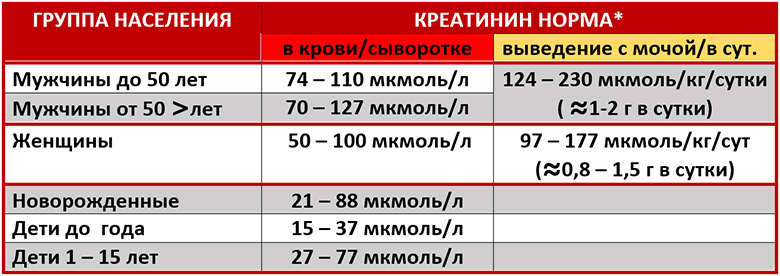
To lower the level of the substance, doctors recommend switching to a calm, measured lifestyle, without physical exertion and emotional turmoil. In addition, it is useful to properly alternate work and rest, and do morning exercises every day.
It is very important to accurately determine the cause of the increase in creatinine in the blood. If kidney function is impaired, this means that the processes of outflow of filtered fluid will not be performed properly.
If there is destruction of muscle tissue, this can cause deterioration in kidney function, as tissue particles enter the bloodstream and destabilize the functionality of the renal system.
Along with this, a deterioration in the filtering ability of the kidneys can occur as a result of hypothyroidism. In any case, it is necessary to undergo a full course of examination and treatment.
Characteristics of creatinine
Creatinine is the final product of amino acid-protein metabolism in the body, which is formed during active contraction of muscle tissue. An increase in the level of this substance in the blood is primarily indicated by impaired excretory function of the kidneys, hormonal imbalances and muscle diseases.
As for the normal amount of creatinine that should be contained in human blood (µmol/l), its levels will depend on age, physical activity and diet.
Table of norms for children and adults
| Age | Normal (µmol/l) |
| Small children | 45-105 |
| pupils | 27-62 |
| men | 74-110 |
| women | 44-80 |
Elevated creatinine is very dangerous for the body. First of all, it signals deterioration of the kidneys, as well as the accumulation of waste and toxins in the blood. Moreover, if you do not take prompt measures to cleanse the blood, you also risk putting your liver at risk. In more advanced cases, heart and kidney failure, gastrointestinal disorders, skin problems and nervous system disorders may occur.
Downgrade methods
You can lower the level of creatinine in the blood using different methods - medication, using folk remedies, by normalizing nutrition.
Drug reduction of the amount of substance in the blood involves the prescription of the following drugs:
- Ketosteril - tablets to normalize the filtering capacity of the kidneys;
- Lespeflan is a herbal preparation with a pronounced diuretic effect;
- Chitosan is an active additive in tablet form. Helps remove toxins.
Taking medications must be strictly under the supervision of a doctor and according to his instructions.
A non-drug method allows you to reduce creatinine in the blood using folk remedies. Some of the most effective methods include herbal teas with diuretic properties.
A few cups of this tea a day helps stimulate kidney function, increasing urine output and creatinine excretion.
Nettle tea is a diuretic, laxative, expectorant and tonic that lowers creatinine in a blood test.
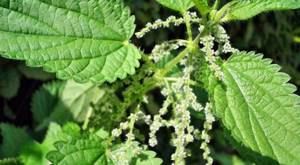
To prepare the drink, not only grass is used, but also nettle flowers. Combination with calendula and knotweed is allowed.
Two tablespoons of nettle are poured with boiling water and infused in a thermos. Take half a glass twice a day.
Sage tea improves kidney function due to the effects of lithospermate B, which is part of the herb.
To enhance the effect, you can prepare tea from the collection with sage, adding burdock, dandelion leaves and birch bark in equal proportions.
Add three tablespoons of the mixture to a glass of boiling water and let it brew. Take three tablespoons of the drink before bed.
Tea made from lingonberry leaves, chamomile, string, violet flowers, motherwort, mixed in equal proportions, is very useful. 60 g of leaves should be poured with a glass of boiling water and steamed in a water bath. Take: 1/3 cup three times a day.
Rosehip is an excellent remedy against many diseases. To remove creatinine, it is recommended to brew rose hips together with bay leaves, hawthorn leaves, dill seeds and parsley root.
Give two tablespoons of the mixture per glass of boiling water and leave for at least three hours. Reception: seven times a day, five tablespoons of tea.
An alternative way to prepare rosehip tea involves adding the same amount of pomegranate peels.
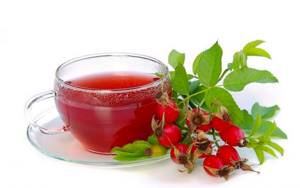
Dandelion root tea is prepared with the addition of equal proportions of violet flowers, St. John's wort and celandine. Take three times a day, half an hour before meals.
In addition, to prepare medicinal teas that lower creatinine in the blood, mint herb, chamomile, oak bark, bearberry herb, rhubarb, birch buds, and lemon balm are used.



